NEVERLAND MORE LOST THAN FOUND
Playwright Alan Knee called Sir J. M. Barrie “the man who was Peter Pan.” If so, it was an author’s compensation as much as creativity. James Barrie was a shy Scotsman, awkward and diffident in public with an extroverted artistry to compensate for self-effacing insecurity. In the 2004 tearjerker motion picture Finding Neverland, inspired by true events but not altogether accurate, Barrie, mercurially played by Johnny Depp, is a mischievous man-child liberated from writer’s block and an inert marriage by a platonic extra-marital relationship with the widowed Sylvia Llewelyn Davies (Kate Winslet) and her four young sons.
With these rambunctious boys as merry muses, and the reluctant backing of American impresario Charles Frohman, Barrie’”apparently stealing characters from everyone around him’”will give the world Peter Pan, or The Boy Who Never Grew Up in 1904. The rest is theater history.
Art allegedly mirrors life: Audiences love that colorful cause-and-effect between source and story, with its occasional and strategic reversals. Audiences also love stories that blend dewy-eyed nostalgia with the cruel disappointments of life (death, broken marriage, orphans, a strict Edwardian society’”my God, the list is endless here). But the film, for all its sumptuous mawkishness, was a hit. So it makes perfect sense that the its original producer, Harvey Weinstein, galvanized a creative team to musicalize the story that traces back a childhood classic to the Davies family. With James Graham’s old-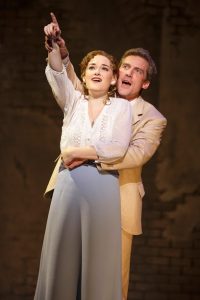 fashioned musical comedy book’”surprisingly engaging given that its saturated with cute tykes and over-the-top supporting characters’”the similarly named Finding Neverland, staged with a trademark comical inventiveness and theatricality by Diane Paulus, opened on Broadway in 2014 (it closed last year after 381 performances).
fashioned musical comedy book’”surprisingly engaging given that its saturated with cute tykes and over-the-top supporting characters’”the similarly named Finding Neverland, staged with a trademark comical inventiveness and theatricality by Diane Paulus, opened on Broadway in 2014 (it closed last year after 381 performances).
There was plenty of charm and appeal on stage at the national tour’s stop in Hollywood last night, but creating a good score proved to be a lot trickier than flying on fairy dust to “the second star on the right and straight on till morning.” The dull, instantly forgettable songs by British pop idol Gary Barlow (Take That frontman) and his longtime collaborator Eliot Kennedy bring down what is already a borderline entertainment pandering to Tinker Bell-loving kids and their ticket-buying parents. No surprise given it was Barlow & Kennedy’s first foray into musical theater. I suppose Weinstein tapped them because they were, I don’t know, British, but the pop and bubble gum sensibility is completely at odds with the story.
And a fascinating tale it is: The mystical destination of Neverland’”where colors burst and shift as they do at dusk or dawn; crocodiles swallow clocks and crave captains; pirates and Indians wage turf wars; and the Lost Boys briefly find a “mother” for their eternally young “father”’”is inspired in Kensington Gardens by the Bohemian-like Davies clan, Barrie’s second family. In a park scene early on, this sometimes appealing but always insistent musical battens onto the editorializing anthem “Believe” (we stop dreaming at our own peril) and never lets go. Faithful to the film, Barrie is a childless, lonely writer bored with his pedestrian, social-climbing, and unfaithful wife (who, perhaps, just wanted people to stop calling her Mary Barrie). The difference in this version is that James falls in love with Sylvia.
As Lewis Carroll did for Alice Liddell, Barrie’s imagination is ignited by pre-teen Peter and his fun-loving, game-playing brothers George, Jack and Michael (“We Own the Night”). This trio morphs into the Darling boys, while Sylvia is transformed into the once and future Wendy. Even their sheep dog Porthos enters posterity by becoming Nana, the famous canine nanny. (The real-life Sammy the dog is, like the boy actors, adorable without making your teeth ache.)
Haunted by the memory of his 14-year-old brother David (whose loss to his mother in an ice-skating accident James could never replace), Barrie is particularly drawn to Peter, himself anguished by his dad’s death and all too eager to grow up and, as Barrie fears, sell out.
Stirred up by Sylvia’s imperious and patrician mother Mrs. DuMaurier, a scandal brews over Barrie’s inexplicable interest in the Davies clan. As with Barrie’s brother and Peter’s father, Sylvia is stricken with cancer; in effect she must leave her sons to James, a spiritual and surrogate father. It’s a flagrant case of life threatening art with death, “an awfully great adventure” as Peter will call it in the play.
Too sick to attend the opening, Peter Pan is reenacted in Sylvia’s bedroom by both the enthusiastic original cast and her sons, but none of the emotional impact of that scene in the movie appears here. Soon thereafter, Sylvia’s all-transfiguring end provides the musical’s most gorgeous moment, one of many awesome spectacles: The dying mother is engulfed in glittering fairy dust, her shawl soars above, and she passes through the dormer window to the Neverland of eternity’”a vortex of lighting, fans and glitter.
Despite Barlow and Kennedy’s regrettably generic crap, Paulus’s enthralling and eye-popping staging perfectly employs Scott Pask’s exhilarating flying sets (most festively in “Welcome to London”) and Jon Driscoll’s deep and ornamentally-patterned projections. Perversely or not, nothing is left to the imagination, notwithstanding the show’s proselytizing for creativity: Waltzing to the shadows that will connect Peter and Wendy, Kevin Kern’s stolid James and Christine Dwyers’ delicate Sylvia croon “What You Mean to Me” (Dwyers soared vocally when soft, but was tight when belting). Earlier, an Edwardian dinner party never looked more sumptuous or felt more dysfunctional. Breaking Barrie’s writer’s block, a not so imaginary Captain James Hook (a bigger than life Tom Hewitt, who also plays Frohman like Daddy Warbucks) ends the first act with a buccaneers’ ballet complete with ship’s rigging (the song here, “Stronger,” is precisely what the songs needed to be).
Wait. There’s more stagecraft. As if inspired by Tinker Bell, Driscoll’s video projections, more cinematic than the Miramax movie, lets us soar high above London and even higher among the speckled stars, rush through the park at night, or rampage though the “Circus of Your Mind,” a song wherein the chorus carries doors in a hypnotic circular motion around Barrie. There’s also a silly romp where the adult actors of Frohman’s troupe (still stereotypes after 113 years) clumsily cavort like kids (“Play”), followed by the boys’ much more believable make-believe (“We’re All Made of Stars”). And it’s beyond ironic that Jonathan Deans sound design is one of the best ever for a tour at the Pantages Theatre; it means I got to hear every imperfect rhyme and cliche in those inane lyrics.
The astonishing and delightful performances are far more persuasive than the show. Particularly poignant are the changeable Davies children (on opening night: Ben Krieger as Peter, Finn Falconer as George, Mitchell Wray as Jack, and Jordan Cole as Michael). While there are many creative hams in the ensemble, the rehearsal scenes for Barrie’s play are crudely comic. There’s also a strange amalgam of authentic Edwardian behavior and anachronistic joking; as if to please everybody, Paulus never settled on a style. And when an actor is asked if he believes in fairies, he slowly scans his fellow players as the audience howls; his response: “My good man, I work in the theater.” At this point, it feels like the creators didn’t give a Tinker Bell’s damn if their musical was timeless (the highly effeminate nobility and thespians got the cheap laugh that Paulus was going for). The more I write, the less forgiving I am of this musical.
More than in the movie’”where the show and its source were kept cunningly apart’”Finding Neverland perpetrates a blurring of origins and dreams that in effect shortchanges Barrie’s achievement: He didn’t just borrow from life; as the boys’ free-form play suggested, he improved on it. Peter Pan is a fantastical fusion of Robert Louis Stevenson, Edward Lear, Victorian pantomime, dime store Western adventures, the actual Davies brothers, and, above all, the brain of Barrie. That’s where Neverland started and stayed, not in a Broadway musical’s “lost and found.”
photos by Carol Rosegg and Jeremy Daniel
Finding Neverland
national tour
ends on March 12, 2017 at the Pantages Theatre
for tickets, call 800.982.2787 or visit Hollywood Pantages
tour continues through August, 2017
for dates and cities, visit Finding Neverland
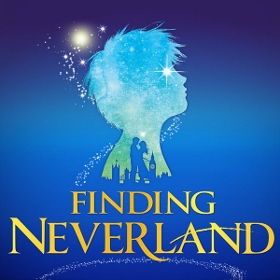
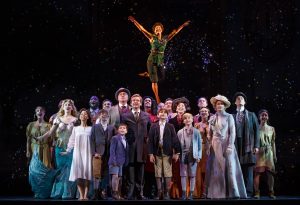
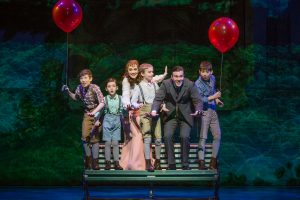
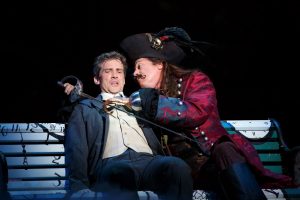
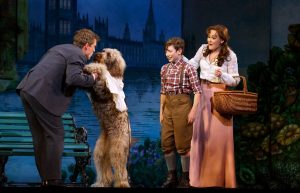
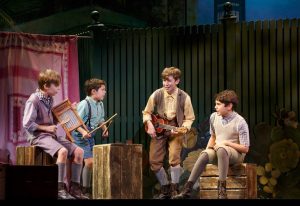
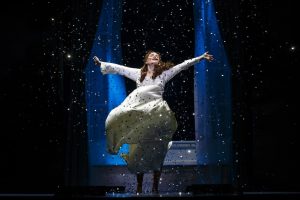
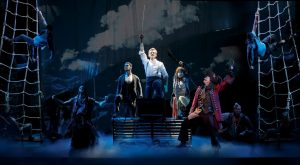
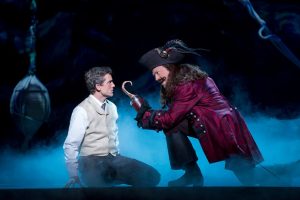
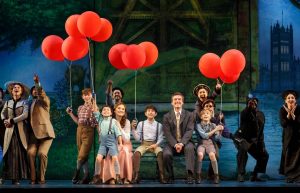

{ 1 comment… read it below or add one }
Mr. Frankel, I saw the original Finding Neverland on Broadway and can report that what you’ve described in your review is a far better show than I experienced in New York. Perhaps for the national tour the creators solved the problem of the charmless book and disunified songs; it’s not a legit musical “score” as nothing holds these tunes together. The only element that made the original Broadway cast worth seeing was the enthralling performance of Kelsey Grammer who is sadly missing from this tour. Thanks for the warning.